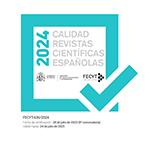The philosophical foundations of pedagogical modernity. Comenius and Descartes
Abstract
In this paper, I intend to analyze the contribution of Comenius and Descartes as two of the main sources of modernity, pedagogical in the case of Comenius and philosophical in the case of Descartes. For this, first at all, I analyze the philosophical basis of Comenius’ pedagogical project, which is focused in the concept of Universal Science. Secondly, I explain why this project seems to configure the pedagogical modernity but not the philosophical modernity. Thirdly, I present the key points of pedagogical Cartesian project, although this project did not make explicit in specific work of Descartes. Finally, I argue that the pedagogical modernity was based on a didactic provided by Comenius but with a Cartesian programmatic framework. This was possible, among other factors, because both share a basic principle of the new pedagogy: the democratization of education.
Downloads
Article download
License
In order to support the global exchange of knowledge, the journal Logos. Anales del Seminario de Metafísica is allowing unrestricted access to its content as from its publication in this electronic edition, and as such it is an open-access journal. The originals published in this journal are the property of the Complutense University of Madrid and any reproduction thereof in full or in part must cite the source. All content is distributed under a Creative Commons Attribution 4.0 use and distribution licence (CC BY 4.0). This circumstance must be expressly stated in these terms where necessary. You can view the summary and the complete legal text of the licence.











